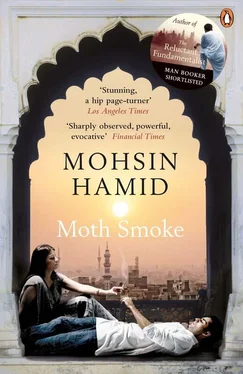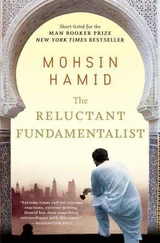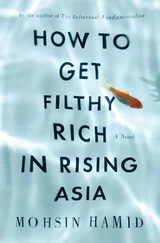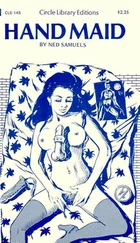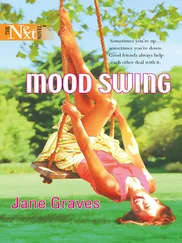It was a summer of great rumblings in the belly of the earth, of atomic flatulence and geopolitical indigestion, consequences of the consumption of sectarian chickpeas by our famished and increasingly incontinent subcontinent. Clenched beneath the tightened sphincters of test sites and silos, the pressure of superheated gases was registering in spasms on the Richter scale.
Lahore was uneasy, and Imodium in short supply.
The perfect time, I thought, for my plan.
Allow me at this point the luxury of a minor digression. Although I proudly admit to being a robber (attaching as I do a certain prestige to my calling), I must make it quite clear, so clear that there is no room for doubt, that I am not a murderer. And while it is true that outlaws of both departments are schooled by the faculty of lawlessness, it is equally true that they are separated by a moral chasm as vast as the difference in syllabi which divides BA candidates from those pursuing a BSc.
You see, it is my passionately held belief that the right to possess property is at best a contingent one. When disparities become too great, a superior right, that to life, outweighs the right to property. Ergo, the very poor have the right to steal from the very rich. Indeed, I would go so far as to say that the poor have a duty to do so, for history has shown that the inaction of the working classes perpetuates their subjugation.
However, because I believe in the primacy of the right to life, I also believe that killing is wrong unless done in self-defense. Although many of my more frivolous friends and acquaintances accuse me of dieting to reduce my weight, the truth of the matter is that I do not eat meat because I am so strongly opposed to killing, and because my sense of compassion is so fat (here defined as grand, expansive, and all-encompassing) that it extends to species beyond our own.
The professional murderers I have known tend to disagree. Their arguments run as follows.
‘Murad, old chum,’ they say. ‘Your moral structures are but feeble attempts to come to terms with the reality of killing, and excuse us for saying so, but you really do miss your mark. When a bird takes wing and you bring your gun to your shoulder and track it and pull and send bits of metal hurtling through the air, ripping through its little feathered body, thereby causing it sufficient physical trauma to begin a process of cessation of vital bodily functions, what do you have? A moral issue? Sport? An illustration of the essential brutality of the universe and the simultaneous meaning and meaninglessness of existence? Of course not. You have a tasty morsel waiting to be seasoned and served with carrots.
‘What once was a free creature which happily flitted about, cheating on his mate and slurping worms out of the soft ground with a flick of his head as if to say, “Ah, this is the life,” is now something stuck between your teeth in such a manner that the toothpick you use to pry it loose leaves your gums feeling just a little bit raw in that deliciously painful but pleasurable way which reminds you of days long since gone when you spent hours twisting at your loosening milk teeth.
‘But you can always justify killing animals on the grounds that you want to eat them, or wear them, or that they smell bad, look funny, bother you, threaten you, and have the bad luck of being in your way. What about killing humans? Well, aside from a few die-hard individualists on the fringe, the general consensus among people these days seems to be that eating and wearing other people is just not on. Wearing a suit which costs as much as a farmer will make in his lifetime is acceptable, but actually putting his eyeballs on a string and letting them dangle above tastefully exposed cleavage is bad form.
‘That said, killing someone because of the other reasons we mentioned above (smell, looks, bother, threat, or bad luck) is quite acceptable. You want deodorants, you know that one in 6.87 million will die from a violent allergic reaction, you shrug and churn the stuff out, and some poor fellow suffers a pain in the armpit beyond imagining and dies, and that’s that: acceptable. You drive cars, knowing eventually you will probably kill somebody or be killed, but “Hurry up, I don’t want to be late for my threading,” and you’re off. No regrets. Or someone who has never been to your farm and seen the cute dimples your youngest daughter is already showing when she smiles decides a line on a piece of paper should be a little to the left, and in the name of God and all that is right, to war boys: kill, kill, kill! Yours not to reason why, but damn it hurts when a land mine blows off your leg.
‘So, Murad, old chum, people kill people all the time, and usually with the barest minimum of fuss. You really must keep a sense of humor about it all. There is no moral issue here. Better to laugh at what you do not understand than to take it seriously and end up giggling hysterically in a padded cell off Jail Road.’
Now, I concede that the murderers do have a point. But I was brought up by my mother to have a strong sense of wrong and right, and in the end I can only say, quite feebly I admit: Placing so little value on human life is wrong.
As for myself, I had no choice. The first and only time I killed a man, it was either him or me, and even so the memory of it saddens me immensely.
Let me elaborate.
I was (why deny it?) something of a celebrity in the transportation industry in those days. The wave of yellow-cab robberies by rickshaw drivers had crested, and the sense of empowerment which coursed through my fellow drivers of three-wheeled vehicles was electric. It was widely and correctly believed that I was the originator of the idea that the rickshaw’s salvation lay in erecting a little barrier to the entry of the yellow cab in our market. Entry barriers are common to all industries, and the spree of robberies of drivers of four-wheeled entrants by drivers of the established three-wheeled holders of market share was simply an example of laissez-faire market economics, as I am sure the good Dr Superb would tell you.
Naturally, the yellow-cab drivers had a different point of view. I was an infamous figure of almost mythical proportions to them, a Redbeard or Red Baron (indeed, my rickshaw sported a little red pennant from her rear mast, a radio antenna), and every second robbery was linked to me in some way. A bounty of ten thousand rupees was placed on my head, soon upped to fifty thousand, and from there to two lakhs. At least three men were killed by bounty hunters and irate yellow-cab drivers in cases of mistaken identity. And I wasn’t always so lucky: two bullets found me out in my hiding places, as I mentioned earlier, and I submit that I shed more than my share of blood.
Eventually, after heavy casualties on both sides, a truce was agreed to, and rickshaw drivers and yellow-cab drivers joined one another in putting an end to the cycle of robbery and reprisal. By this point, most of the robbing was being done by professional thugs who had nothing to do with either side but simply saw a good opportunity and did not discriminate between the types of vehicles they robbed. So both three- and four-wheeled transporters banded together against this common threat.
The bounty on my head was withdrawn, and I came out of hiding a hero to rickshaw drivers and a feared but respected former adversary to yellow-cab men. All sorts of rumors were circulating: that I had killed six men with my bare hands and eaten their livers, that I could shoot the cap off a bottle of Pakola at twenty paces, that I had once caught a bullet in my teeth and spat it away unharmed. Truth be told, I had never killed anyone, was a fair shot at best, and had teeth so weak I avoided eating sugarcane, but I encouraged the rumors, because they deterred would-be aggressors and, to be frank, flattered my ego.
Читать дальше
